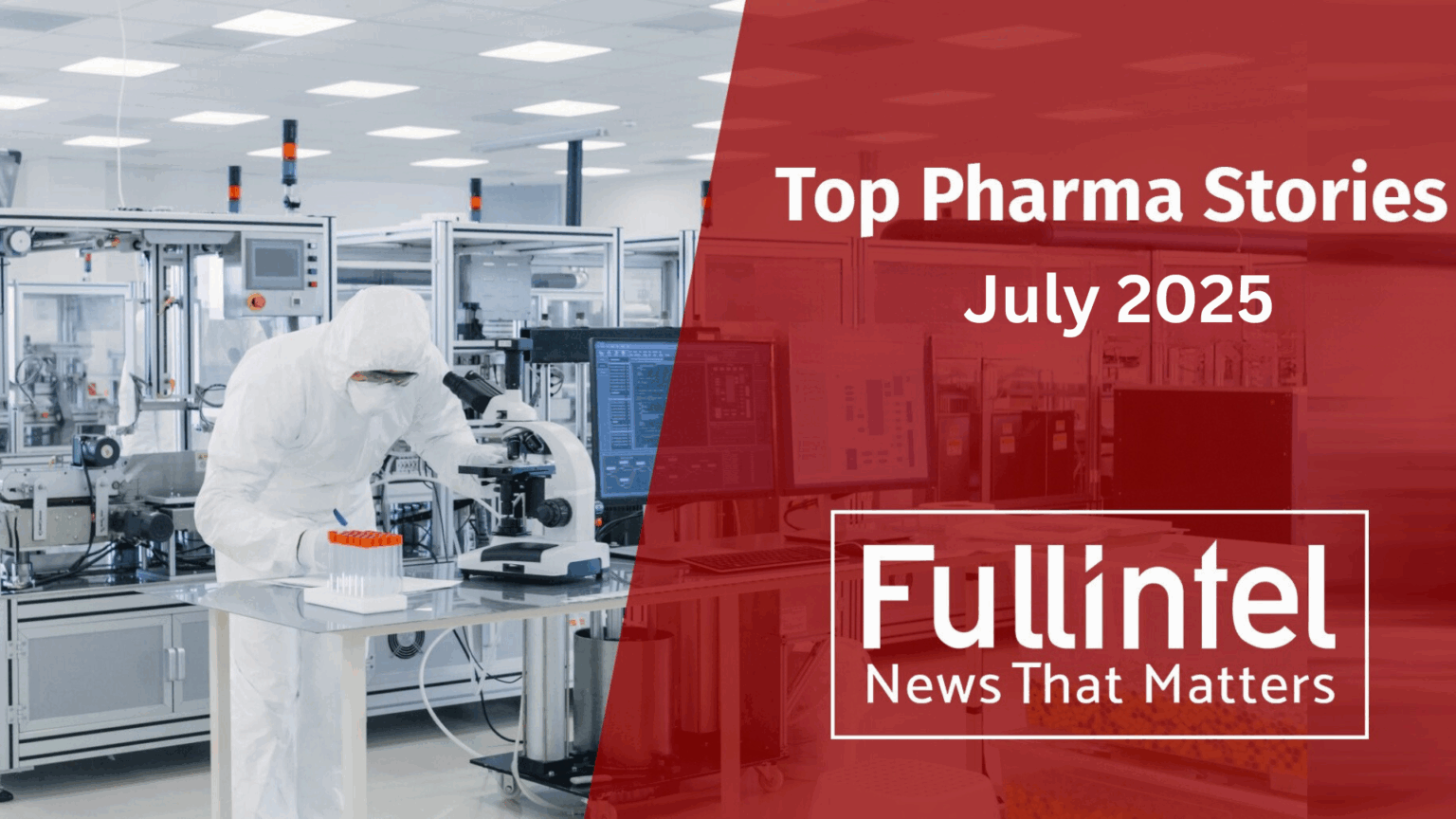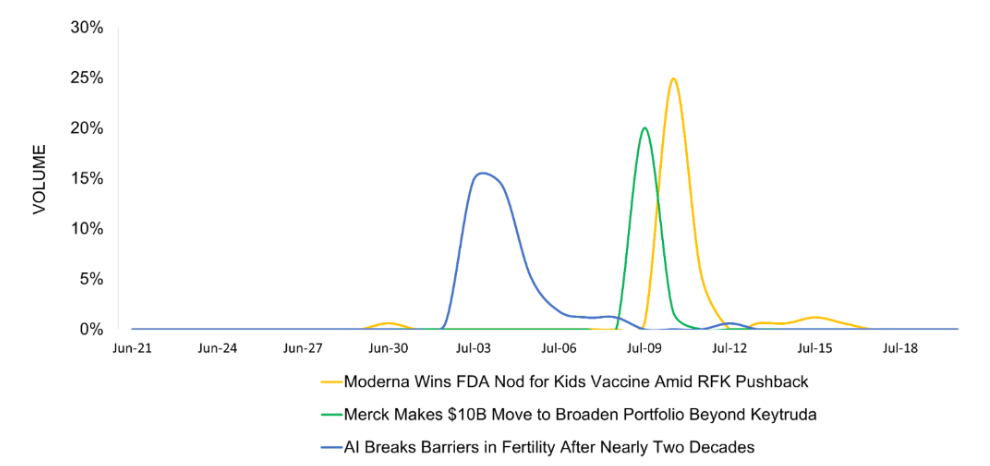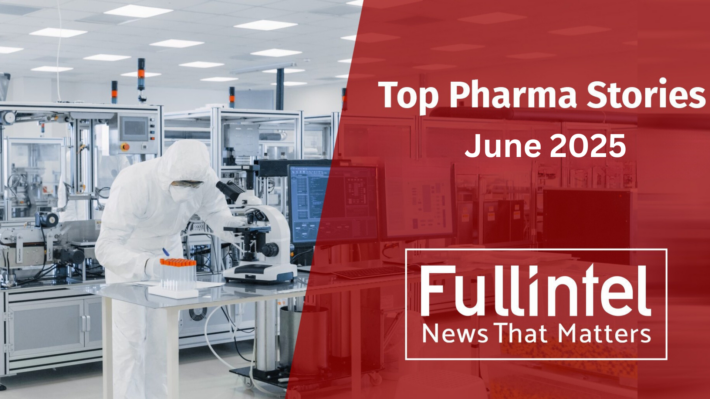Top Pharma News in July 2025

This month’s healthcare and pharmaceutical headlines reflect the growing influence of politics, corporate strategy, and innovation on public health. Limited FDA approval of some COVID vaccines, major acquisitions to expand treatment portfolios, and advances in AI-assisted fertility care show how decisions around access, investment, and technology are shaping the industry. These developments signal a shift in how treatments are developed, delivered, and perceived by the public, highlighting the evolving relationship between science, regulation, and trust. As the healthcare landscape evolves, the Fullintel Hub provides timely insights to keep stakeholders informed and prepared.
July’s Top Stories:
Moderna’s Vaccine for Children, Merck’s $10B Deal, and AI-Driven Fertility Success Shape July’s Pharma Narrative

Three key developments shape healthcare media coverage in July:
- Moderna Wins FDA Nod for Kids Vaccine Amid RFK Pushback
- Merck Makes $10B Move to Broaden Portfolio Beyond Keytruda
- AI Breaks Barriers in Fertility After Nearly Two Decades
This month’s top health and pharma stories spotlight pivotal developments in vaccine policy, biotech investment, and medical innovation. The FDA restricts Moderna’s COVID-19 vaccine approval for children to high-risk cases, aligning with HHS Secretary RFK Jr.’s controversial stance on limiting access. Merck announces a $10 billion acquisition of Verona Pharma to reduce its reliance on Keytruda, drawing attention from investors and the media. In a breakthrough for reproductive medicine, Columbia University’s AI-powered STAR method enables a couple to conceive after 18 years of infertility, signaling new possibilities in male infertility treatment.
A Closer Look at July’s Top Pharma Headlines:
Moderna Wins FDA Nod for Kids Vaccine Amid RFK Pushback
The FDA approves Moderna’s COVID-19 vaccine for children aged 6 months to 11 years, but only for those at higher risk. Vaccine chief Vinay Prasad overrides internal reviewers, citing outdated data, unclear benefits for healthy children, and long-term safety concerns. The move follows HHS Secretary RFK Jr.’s continued push to restrict vaccine access, including removing COVID shots from the recommended schedule for healthy kids and pregnant women. A new CDC panel, which includes vaccine skeptics, also questions the need for the vaccine. Uptake remains low, with only 13% of children vaccinated despite over 150 pediatric deaths in the past year. Media attention rises after the FDA limits Moderna’s COVID-19 vaccine to high-risk children. Experts warn that the move leaves many, especially those under 2 and with higher hospitalization risk, unprotected. Online response is modest but emotionally charged, with anger as the dominant reaction. The decision, aligned with RFK Jr.’s broader effort to restrict vaccine access, fuels public concern and growing scrutiny.
Merck Makes $10M Move to Broaden Portfolio Beyond Keytruda
Merck acquires U.K.-based Verona Pharma for $10 billion to expand its respiratory drug portfolio as Keytruda nears patent expiry in 2028. The deal brings in Ohtuvayre, a new treatment for chronic obstructive pulmonary disease forecast to generate $3 to $4 billion in sales by the mid‑2030s. This marks Merck’s largest acquisition since 2023 and signals its continued push to diversify beyond oncology. Analysts view the acquisition as positive but stress the need for further portfolio expansion. Following the announcement on July 9, Merck shares rose nearly 3% and Verona’s surged 21%. Coverage on July 10 skews neutral to positive, with online commentary reflecting surprise and strategic interest in Merck’s $10 billion acquisition, prompting discussion about the company’s broader long-term growth strategy beyond Keytruda.
AI Breaks Barriers in Fertility After Nearly Two Decades
After 18 years of unsuccessful IVF attempts due to azoospermia, a couple achieves pregnancy through a new AI-powered technique called STAR. Developed at Columbia University Fertility Center, the STAR system uses high-speed imaging and AI to detect rare, hidden sperm in semen samples that traditional methods miss. In one case, AI identified 44 sperm within an hour after technicians found none over two days. For this couple, the system found just three sperm—enough to achieve a successful IVF pregnancy. Media coverage peaks from July 3 to 5 as the first STAR-enabled pregnancy is confirmed. Reports highlight the method’s potential to transform male infertility care, generating widespread optimism and emotional responses online. While the response is largely positive, experts call for further validation before broader adoption. The story fuels growing interest in AI’s expanding role in fertility medicine.
Angela is VP of Insights at Fullintel—a media intelligence company that specializes in news monitoring and analysis. She has worked in media measurement for 15 years, helping brands improve business results through data-driven, actionable insights. From public relations agencies like Lippe Taylor to media research firms like PRIME Research, she has consulted across industries, particularly healthcare and pharmaceuticals. She has presented and published several award-winning research papers about news content that drives recall, engagement, and brand trust. Her “Trust in Pharma” research outlines how biopharma brands can build and sustain trust.
She contributes knowledge at the intersection of academia and practice as director of the International Public Relations Measurement Commission and as a member of the International Public Relations Research Conference Board. Her contributions have been recognized with multiple industry awards, including PRNEWS People of the Year (Data & Measurement Game Changer), PRNEWS Top Women (Industry Champions), and AMEC Rising Star for innovation in communication measurement.








